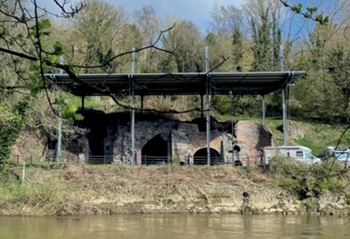Infrastructure sector posts second consecutive triple digit gain in October
- Approvals for green energy planning applications continue to go through the roof
- Approvals demonstrate the government’s commitment to green energy transition
- Residential contract awards are up 41% as housebuilding looks to growth.
- Commercial & Retail projects see a strong month for contract awards rising 189% to £1.1bn
Approval of infrastructure projects increased 298% in October, the second consecutive month the sector has posted triple digit gains. In September approvals were up 136%, according to construction analysts Barbour ABI.
The huge gains are driven by big movements in green energy projects. Five renewable energy projects, all over £100m in value, drove the October gain. Ossian Offshore Wind Farm 3.6GW is the largest of these projects at £3.6bn. In the previous month 700MW and 1000MW Battery Storage Projects in Scotland and the North East were behind the big numbers.
The UK’s largest infrastructure approvals in October were worth around £3.5billion and included:
- Ossian Offshore Wind Farm (3.6GW) - Scotland
- Stanlow HyNet Hydrogen Production Plant - North West
- Cottam Solar ProjectEast (600MW) - Midlands
- The Balk, Almholme - Solar Farm (49.9MW) and Energy Storage System - Yorkshire and Humber
- Bob Lane Battery Energy Storage System (264MW) - South East
Barbour ABI head of business and client analytics, Ed Griffiths said
“Another mega month for renewable energy approvals demonstrates the laser focus the Labour government has on driving through a green energy transition at all costs.
We’ve seen a string of massive approvals in recent months, including one of the largest solar farms on record. The government seems intent on leaving the flood gates open to these kinds of project, even as protests mount about their potential impact on the countryside.”
The wider construction industry saw 44% and 59% gains in monthly approvals. in September, brand new applications also appear to be following the trend with a 18% increase in infrastructure projects entering the planning system, led by a series of battery storage projects and wind farms.
[edit] Contract Awards boost for housebuilders and commercial developers
Elsewhere housebuilding saw some positive signs as the government searches for ways to meet a 1.5million homes pledge. Whilst the overall value of contracts awarded for construction projects have remained stable, residential saw its highest month since January 2023 soaring 41% to £2.5bn, helped along by two projects totalling £540m in the North West.
Commercial & Retail projects saw a strong month for contract awards rising 189% to £1.1bn after the worst month this year in September with three projects in London worth over £100m help the sector.
In general, awards in October saw a decrease of 36% to £6.5bn returning to normal after an inflated September.
Griffiths continued: “Although we have seen a decrease in contract awards from last month, given the high value that came from a small number of projects, it is more realistically another flat month for awards overall.
The government's recent budget offered little in tackling the major risks to the industry. In fact, in a labour-intensive industry like construction, labour costs will likely increase putting more pressure on SME's.
The reform to apprenticeships under the new Growth and Skills Levy has the potential to help reduce the skills shortages but focus on construction apprenticeships will have to be pushed by the sector itself. Housebuilding and Infrastructure were areas of promise.
However, the number of housing starts and finishes has increased in recent months possibly showing an increased confidence in the sector.”
-- Barbour ABI
--Barbour ABI 10:53, 18 Nov 2024 (BST)
[edit] Related articles on Designing Buildings
- Construction contract awards provide relief in the wake of ISG collapse
- Construction contract awards jump to £7.3bn in May as uncertainty continues
- Construction industry revs engines in January
- Election fails to spark construction industry revival
- Government construction and infrastructure pipelines.
- Green infrastructure.
- Growth and Infrastructure Act.
- Homeowners turn to green energy upgrades as home improvement activity declines
- Infrastructure and Projects Authority.
- Infrastructure UK (IUK).
- Infrastructure nationalisation.
- Infrastructure tumbles, adding to construction industry woes
- London construction cools as hotspots appear nationally
- London infrastructure plan.
- National Infrastructure Pipeline.
- National Infrastructure Plan.
- Nationally Significant Infrastructure Projects.
- New energy rules, a threat to towns and cities across UK
- Planning approvals increased by 20% in June ahead of Labour’s new drive for housebuilding
- Residential takes the reins from infrastructure as contract awards even out
- Resilience of UK infrastructure and climate predictions.
- Smart cities.
- Subdued planning environment figures provide scant hope for house-building targets
- The future of green infrastructure.
- Traffic and transport.
Featured articles and news
The act of preservation may sometimes be futile.
Twas the site before Christmas...
A rhyme for the industry and a thankyou to our supporters.
Plumbing and heating systems in schools
New apprentice pay rates coming into effect in the new year
Addressing the impact of recent national minimum wage changes.
EBSSA support for the new industry competence structure
The Engineering and Building Services Skills Authority, in working group 2.
Notes from BSRIA Sustainable Futures briefing
From carbon down to the all important customer: Redefining Retrofit for Net Zero Living.
Principal Designer: A New Opportunity for Architects
ACA launches a Principal Designer Register for architects.
A new government plan for housing and nature recovery
Exploring a new housing and infrastructure nature recovery framework.
Leveraging technology to enhance prospects for students
A case study on the significance of the Autodesk Revit certification.
Fundamental Review of Building Regulations Guidance
Announced during commons debate on the Grenfell Inquiry Phase 2 report.
CIAT responds to the updated National Planning Policy Framework
With key changes in the revised NPPF outlined.
Councils and communities highlighted for delivery of common-sense housing in planning overhaul
As government follows up with mandatory housing targets.




















